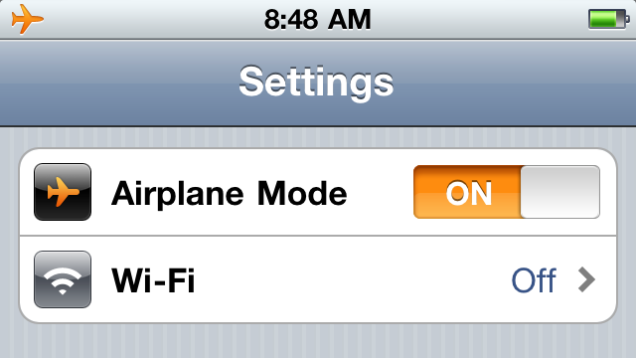November 22, 2016|כ"א חשון ה' אלפים תשע"ז How Using Airplane Mode While on the Ground Can Change Your Life
Print Article A few weeks ago, I was in the middle of davening Mincha with unusually-focused kavana, when I suddenly heard a bas kol, a heavenly voice proclaim, “Message received.” I was reveling in the news that the combination of my heartfelt expressions of praise, personal requests, and gratitude had in fact been received by the Almighty, when suddenly I heard it again, “Message received.” At that point I realized it was no heavenly voice; it was someone’s cell phone with an alert set for each text message received. I must admit that for the rest of that Amidah, I struggled to overcome my resentment and frustration and return to the level of focus and concentration I had previously achieved.
A few weeks ago, I was in the middle of davening Mincha with unusually-focused kavana, when I suddenly heard a bas kol, a heavenly voice proclaim, “Message received.” I was reveling in the news that the combination of my heartfelt expressions of praise, personal requests, and gratitude had in fact been received by the Almighty, when suddenly I heard it again, “Message received.” At that point I realized it was no heavenly voice; it was someone’s cell phone with an alert set for each text message received. I must admit that for the rest of that Amidah, I struggled to overcome my resentment and frustration and return to the level of focus and concentration I had previously achieved.A few days before this incident, a friend shared with me an experience at a tragic funeral he had attended. A young man passed away and throngs came out to pay him kavod acharon, final respect. As the crowd became silent and the officiating rabbi was about to begin, the chilling words “You’ve arrived at your destination,” were proclaimed. The person sitting next to my friend immediately commented, “final destination.” Someone had used a GPS app to direct them to the funeral and had failed to silence his phone, rudely disrupting the beginning of a tragic funeral.
Technology has enhanced our lives in countless ways, but it has also compromised and challenged the very foundation of existence, a sense of mindfulness and consciousness in all that we do. A recent study shows that the average person checks his or her phone every six and a half minutes. Half of teens say they are addicted to their smartphones. Other research shows that smartphones are actually making us stupid, not smart. Indeed, for super successful people like Warren Buffett, the “flip phone” is making a comeback.
In his essay, “Menuchas Ha’Nefesh,” Rav Chaim Friedlander writes, “The truth is, menuchas ha’nefesh, peace of the soul, is a fundamental and critical attribute upon which all success in every aspect of life rests…A person who is scattered, distracted and fragmented cannot achieve anything fully or in fullness.”
We all see the difference between the quality of our conversations, interactions, and experiences on Shabbos when we are liberated from and free of technology, from those that take place during the week, when whatever we are doing is competing with the alerts, notifications, vibrations and sounds that are relentlessly bombarding us. The Zohar (3, 29a) says, “a scholar is called Shabbos.” R’ Chaim Friedlander explains that it is because the scholar and righteous are able to experience the entire week with the menuchas ha’nefesh, the peacefulness of the mind and soul, that Shabbos provides.
I recently spent time in Israel and unlike in the past, I intentionally did not rent a SIM card to power my smartphone. As a result, I only had access to the usual barrage of emails and texts when I was near Wi-Fi. That meant every time I davened on the trip, I was entirely disconnected from technology and exclusively connected to my conversation with Hashem. When I was out with my family, I was entirely immersed in whatever activity or conversation we were having, and utterly inaccessible and disconnected from all others.
The experience was enlightening. My davening, conversations, and experiences were energized and experienced more fully than ever. When I returned, I was depressed by the thought that I had left my mindfulness and menuchas ha’nefesh behind. But then it dawned on me: I didn’t have to leave it behind at all. Each time we fly, we have to put our phones in airplane mode which disables the ability to receive calls or messages or be connected online. (Although it seems the era of being disconnected while flying is coming to an end, too.) It dawned on me that airplane mode works, even while on the ground.
Even if we are unable to switch to a flip-phone, or to turn our phones off, we can disconnect at will. When we walk into davening or begin a conversation we want to be fully present for, we can form the habit and ritual of switching to airplane mode. We can have Shabbos during the week and experience menuchas ha’nefesh by simply adjusting one setting when we want to connect to what we are doing.
The Chovos H’Levavos writes that he knew a righteous man who used to pray “Ha’Makom yatzileini mipizur ha’nefesh, May God spare me from the scattering of the soul.” Let us pray that we maximize our use of technology without scattering our souls and that we successfully maintain a sense of mindfulness in a world of mindlessness.






